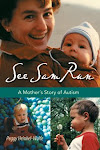A few days after my father first held my newborn son, he whispered to my mother his fear for our baby’s health, a fear that would prove prophetic.
Our oldest son, Sam, was born with autism.
At the time, my mother had cautioned my father: how could he know for certain what Sam’s faraway eyes and fussiness meant?
My father had years of experience as a dentist treating patients with disabilities who lived at the long-term care center in our hometown. He needed more than his hunch before the word could be said out loud.
As a result, my husband and I anguished for almost five years, asking many health and education professionals for answers that could help our son. A developmental pediatrician finally made the diagnosis in 1993.
Since our son’s diagnosis, some doctors have gotten bolder, looking for autism earlier in a child’s life. The Checklist for Autism in Toddlers, or CHAT, has proven helpful screening children at 18 months old. But there is no blood test, x-ray, or magnetic image that marks autism. The physical evidence found in the autistic brain, thus far, can only been seen forensically.
The lifelong struggle with language and social development distinguish the disability, making health and education professionals hesitate to make the call with children. But that also leaves room for Monday morning quarterbacks to ignorantly blame parents for a child’s behavior and dismiss them as brats.
Researchers are now looking for markers as soon as infancy. A fussy baby could have more than colic, and doctors may soon be able to offer something more to frantic parents. Perhaps the most promising study yet has come out of Canada, where researchers are testing eye movements of babies to determine whether that, too, could be a predictor for autism.
However, there remains no cure. Once a toddler has been identified as at risk of having autism, the real work begins. Families need support and services to help affected children adapt their Spartan world to ours; and communities must invest in those services in order to make an early diagnosis realize its true worth.
Our family, and the millions of others touched by autism, can testify that the investment is money well-spent. Every day, employers and educators are unlocking the extraordinary talents of individuals with autism, who in turn give to us a fresh outlook on what really matters.






No comments:
Post a Comment